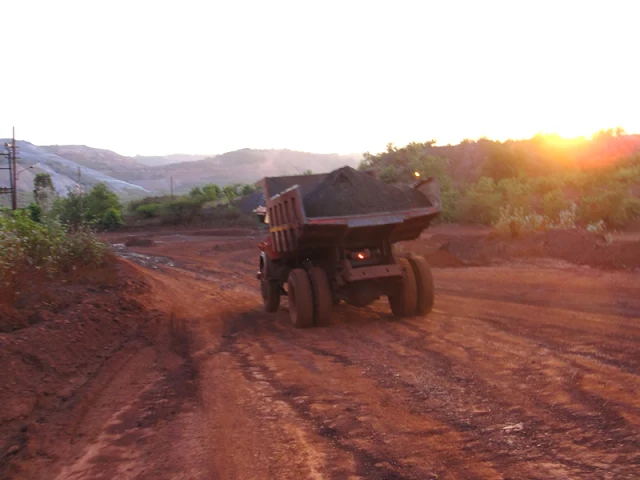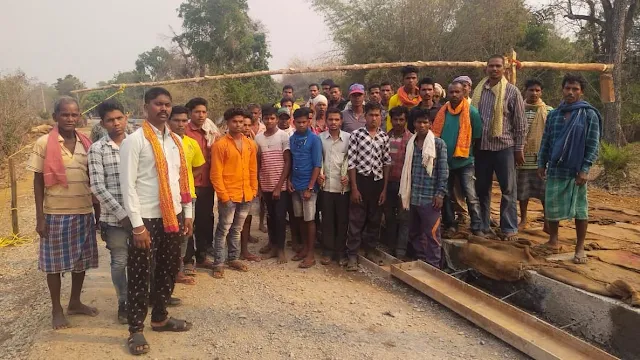By Lakhan Nureti*
Hundreds of tribals of affected villages, protesting against iron ore mining in Rowghat mountains in Chattisgarh, have blocked the road in village Khodgaon, and are sitting on dharna. The protest began on March 26, 2022 against the permission given to the Bhilai Steel Plant (BSP) by the Union Environment Ministry on January 25, 2022 to mine 3 lakh tonnes per annum ore and transport it through roads.
The permission was granted despite the fact that, till date, no Gram Sabha of any affected village has given its consent to this mining project, thereby making the mines illegal.
On March 15, 2022, when BSP's contractor Dev Mining Company started iron ore transportation by attempting to evacuate two truckloads of iron ore, the villagers got angry and ensured that the Tipper truck drivers emptied out their loads in the middle of the village Khodgaon.
The villagers declared that the mining was illegal and tried to register an FIR against the Dev Mining Company on the charge of theft of ore, and also under the Scheduled Tribes (Prevention of Atrocities) Act, but the police did not register it.
Villagers say that again some tipper trucks have clandestinely gone up the Rowghat mountains at night, taking advantage of the darkness. Thus, to stop this illegal mining, the villagers have been practically living on this road since March 26 night, cooking there, sleeping there and continuously guarding the road.
On the morning of March 27, the villagers set up a checkpoint on the road. People from many nearby villages came out in support – Khodgaon, Khadkagaon, Binjali, Parlabhat, Khairabhat and other Rowghat mining-affected villages -- have reached the spot.
As per clause A(xxii) of the Environment Clearance granted to the Company on June 4, 2009, all trucks are permitted to ply on these roads only during daytime, and any transportation during night is strictly prohibited.
The company also assured the Ministry of Environment several times that all transportation will be during day time. So not only is the mining completely illegal, the surreptitious attempts to ferry the trucks at night time directly flies in the face of the environmental clearance.
According to villagers, BSP authorities have been making many false promises to the villagers for many years, but is not fulfilling any of them. After the trees were felled in the mining area on the top of the hill, the loose soil slipped down during rains, and surrounded the Khodgaon camp.
When the government cannot even secure its own camp from this mining, how will our villages, our homes, our farms be made safe? According to tribal traditions, the adivasi deity Raja Rao resides at Rowghat, and it is a holy place for them.
Hundreds of tribals of affected villages, protesting against iron ore mining in Rowghat mountains in Chattisgarh, have blocked the road in village Khodgaon, and are sitting on dharna. The protest began on March 26, 2022 against the permission given to the Bhilai Steel Plant (BSP) by the Union Environment Ministry on January 25, 2022 to mine 3 lakh tonnes per annum ore and transport it through roads.
The permission was granted despite the fact that, till date, no Gram Sabha of any affected village has given its consent to this mining project, thereby making the mines illegal.
On March 15, 2022, when BSP's contractor Dev Mining Company started iron ore transportation by attempting to evacuate two truckloads of iron ore, the villagers got angry and ensured that the Tipper truck drivers emptied out their loads in the middle of the village Khodgaon.
The villagers declared that the mining was illegal and tried to register an FIR against the Dev Mining Company on the charge of theft of ore, and also under the Scheduled Tribes (Prevention of Atrocities) Act, but the police did not register it.
Villagers say that again some tipper trucks have clandestinely gone up the Rowghat mountains at night, taking advantage of the darkness. Thus, to stop this illegal mining, the villagers have been practically living on this road since March 26 night, cooking there, sleeping there and continuously guarding the road.
On the morning of March 27, the villagers set up a checkpoint on the road. People from many nearby villages came out in support – Khodgaon, Khadkagaon, Binjali, Parlabhat, Khairabhat and other Rowghat mining-affected villages -- have reached the spot.
As per clause A(xxii) of the Environment Clearance granted to the Company on June 4, 2009, all trucks are permitted to ply on these roads only during daytime, and any transportation during night is strictly prohibited.
The company also assured the Ministry of Environment several times that all transportation will be during day time. So not only is the mining completely illegal, the surreptitious attempts to ferry the trucks at night time directly flies in the face of the environmental clearance.
According to villagers, BSP authorities have been making many false promises to the villagers for many years, but is not fulfilling any of them. After the trees were felled in the mining area on the top of the hill, the loose soil slipped down during rains, and surrounded the Khodgaon camp.
When the government cannot even secure its own camp from this mining, how will our villages, our homes, our farms be made safe? According to tribal traditions, the adivasi deity Raja Rao resides at Rowghat, and it is a holy place for them.
Also the people of Rowghat region have faith in several deities located here, which are an important part of their culture such as the gods Gumankal and Gadelkal, who live in the land given away on mining lease. Important deities will be insulted by mining activities, hurting religious sentiments of people.
All the surrounding villages are dependent on these mountains for their minor forest produce and for indigenous medicines. It is said that when there was a lack of rain here a few decades ago, people had spent many years by consuming honey in the mountain forest and eating wild tubers and herbs.
Villagers say that there is constant pressure coming from the police and the collector's office that the dharna should be stopped. On one hand the villagers are being threatened that they will be implicated in Naxalite cases, on the other, they are being called to the Janpad office and offered bribes that they can get anything they want from the authorities.
Some of the mining-affected villages have also obtained Community Forest Rights and Community Forest Resource Rights under the Forest Rights Act, 2006, which are being directly violated by this mining project.
All the affected villagers and agitating people who are blockading the road in Rowghat area demand that the mining project should be closed, the approval for the mines should be cancelled and no decision should be taken without the free and informed consent of the Gram Sabhas.
All the surrounding villages are dependent on these mountains for their minor forest produce and for indigenous medicines. It is said that when there was a lack of rain here a few decades ago, people had spent many years by consuming honey in the mountain forest and eating wild tubers and herbs.
Villagers say that there is constant pressure coming from the police and the collector's office that the dharna should be stopped. On one hand the villagers are being threatened that they will be implicated in Naxalite cases, on the other, they are being called to the Janpad office and offered bribes that they can get anything they want from the authorities.
Some of the mining-affected villages have also obtained Community Forest Rights and Community Forest Resource Rights under the Forest Rights Act, 2006, which are being directly violated by this mining project.
All the affected villagers and agitating people who are blockading the road in Rowghat area demand that the mining project should be closed, the approval for the mines should be cancelled and no decision should be taken without the free and informed consent of the Gram Sabhas.
---
*National Alliance of People's Movements



Comments